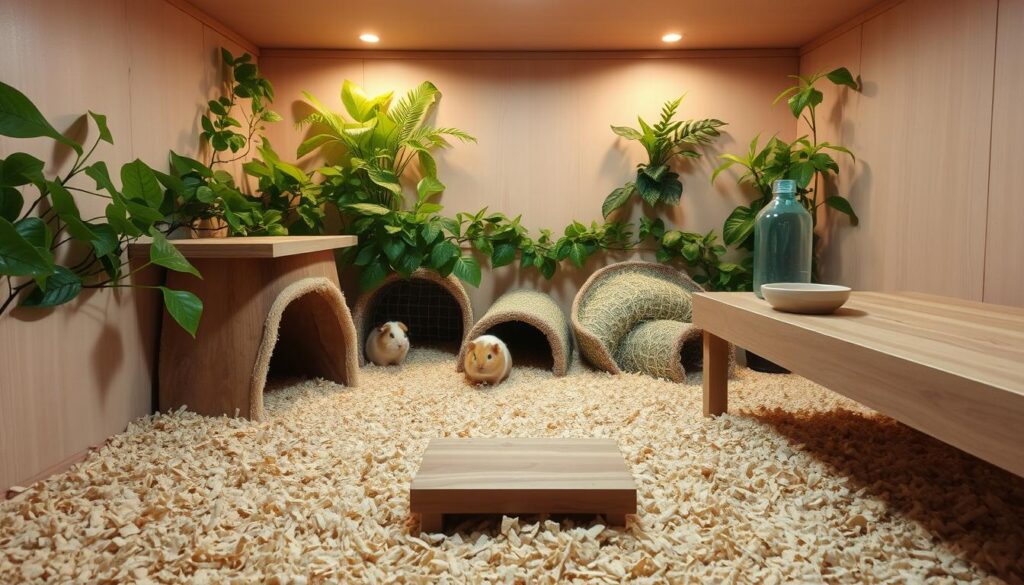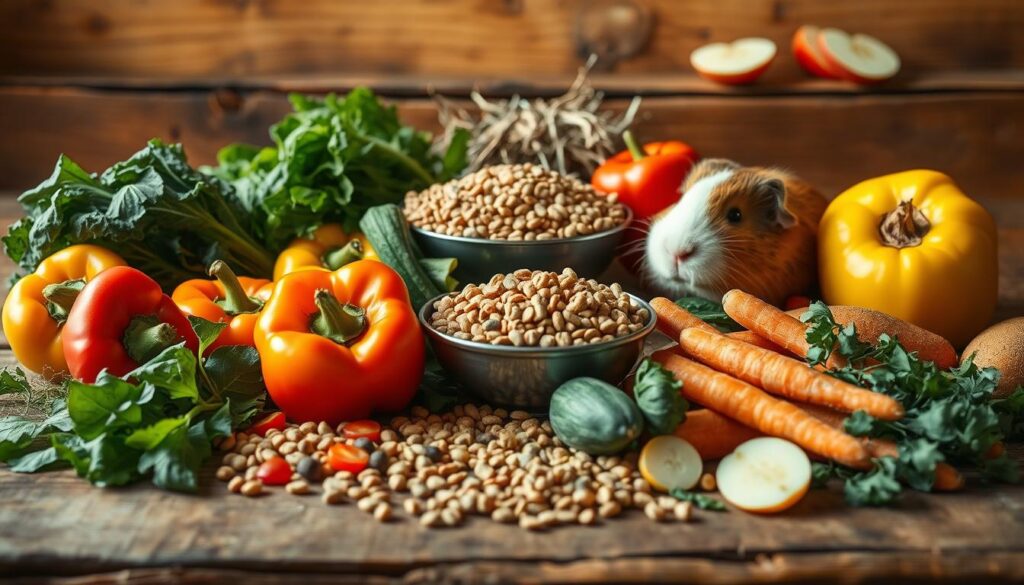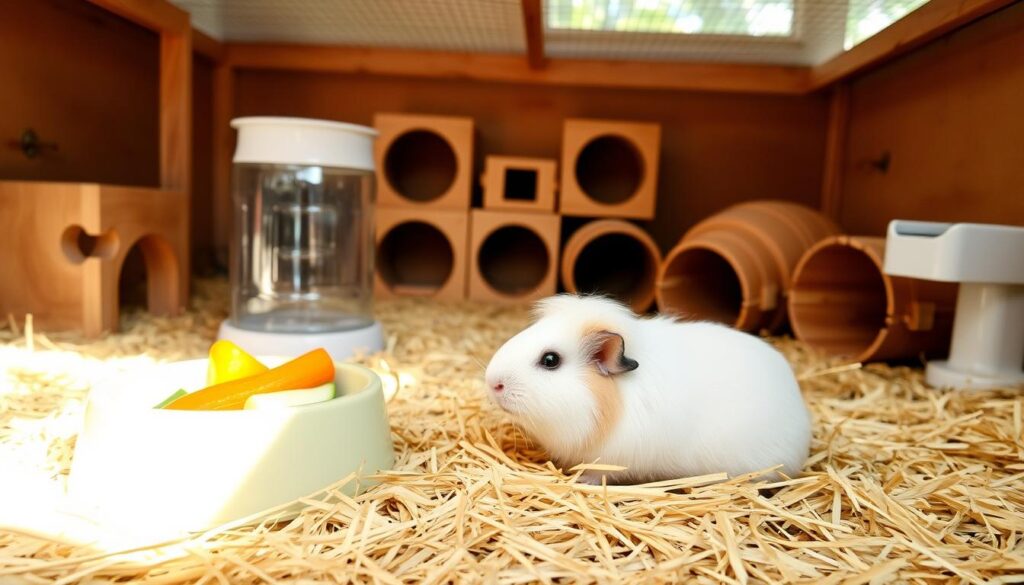Ensuring the comfort and well-being of guinea pigs requires a thoughtful and comprehensive care routine. A well-cared-for guinea pig is not only happy and healthy but also thrives under the right conditions. Understanding their unique needs is the first step towards providing a nurturing environment.
To start, it’s essential to understand that a guinea pig’s health and happiness depend on a combination of factors including their habitat, nutrition, and overall care. By focusing on these key areas, you can develop a routine that caters to their specific requirements, ensuring they lead a healthy and fulfilling life.


Table of Contents
ToggleKey Takeaways
- Understand the unique needs of your guinea pig
- Set up an ideal habitat for comfort and health
- Provide proper nutrition for overall well-being
- Regularly clean and maintain their living space
- Monitor their health and adjust care as needed
- Ensure social interaction and mental stimulation
Understanding Your Guinea Pig’s Needs
The key to a thriving guinea pig lies in comprehending their natural behaviors and the importance of a consistent routine. Guinea pigs are social creatures that thrive in environments that mimic their natural habitats.Natural Behaviors and Instincts
Guinea pigs are inherently curious and active animals. In the wild, they live in herds and spend their time foraging for food, exploring their surroundings, and interacting with other guinea pigs. These natural behaviors and instincts are crucial to their well-being. To cater to these needs, it’s essential to provide a spacious cage that allows for movement and exploration.- Provide hiding places and toys to stimulate their natural curiosity.
- Ensure the cage is large enough for them to move around comfortably.
- Include tunnels or other enrichment activities to mimic their natural foraging behavior.
The Importance of Routine for Guinea Pigs
Establishing a consistent daily routine is vital for guinea pigs, as it provides them with a sense of security and stability. A regular routine helps in reducing stress and promoting overall health. This routine should include regular feeding times, playtime, and sleep schedules.- Feed your guinea pig at the same time every day to establish a feeding routine.
- Allocate specific times for play and interaction to keep them engaged and stimulated.
- Maintain a consistent sleep schedule by ensuring their environment is quiet and dark at night.
Setting Up the Ideal Guinea Pig Habitat
Setting up the ideal habitat for your guinea pig requires careful consideration of several key factors. A well-designed environment not only ensures their physical health but also contributes to their mental well-being.
Cage Size and Requirements
The cage should be spacious enough to allow your guinea pig to move around comfortably. A minimum size of 7.5 square feet is recommended to provide ample space for exercise and exploration. A larger cage can significantly enhance your guinea pig’s quality of life by giving them room to roam and engage in natural behaviors. When choosing a cage, consider the bar spacing to prevent escape or injury. The bars should be sturdy and close enough together to keep your guinea pig safe.Bedding Options and Maintenance
Selecting the right bedding is crucial for your guinea pig’s health and comfort. Options include wood shavings, hay, or specialized guinea pig bedding. It’s essential to avoid cedar shavings due to their potential health risks. The bedding should be absorbent, safe, and easy to clean.- Wood shavings: A popular choice due to their absorbency and comfort.
- Hay: Provides a natural environment and can be used as a bedding material, though it may require more frequent cleaning.
- Specialized guinea pig bedding: Designed for safety and comfort, these beddings are often made from materials that are gentle on guinea pigs’ feet.
Temperature and Placement Considerations
The cage should be placed in a quiet, draft-free area with a stable temperature between 65-75°F (18-24°C). Avoid placing the cage near windows that receive direct sunlight, as this can cause overheating. Maintaining a stable temperature is vital for your guinea pig’s health, as extreme temperatures can lead to stress and illness.Essential Cage Accessories
To create a stimulating environment, include essential cage accessories such as food dishes, water bottles, hiding places, and toys. Variety is key to keeping your guinea pig engaged and active. Rotate toys regularly to prevent boredom and encourage exploration.- Food dishes and water bottles: Ensure easy access to food and water.
- Hiding places: Provide tunnels or boxes to give your guinea pig a sense of security.
- Toys: Include chew toys, tunnels, and climbing structures to stimulate natural behaviors.
Nutrition: The Foundation of Guinea Pig Health
Providing the right nutrition is fundamental to ensuring your guinea pig leads a healthy and happy life. A balanced diet is crucial for maintaining their overall health, and guinea pigs have specific dietary needs that must be met.
Daily Dietary Requirements
Guinea pigs are herbivores and require a diet rich in fiber, vitamins, and minerals. High-quality guinea pig pellets should be the main staple, providing essential nutrients like vitamin C, which is crucial for their health. A good quality pellet should be formulated specifically for guinea pigs, avoiding mixes that contain seeds, nuts, or dried fruits, as they can be harmful.Fresh Vegetables and Fruits Guide
Supplementing their diet with a variety of fresh vegetables and fruits daily is essential. Leafy greens like kale, spinach, and lettuce are excellent choices, as are vegetables like bell peppers, carrots, and cucumbers. Fruits can be given in moderation due to their high sugar content. Safe options include apples, strawberries, and melons.| Vegetable/Fruit | Frequency | Notes |
|---|---|---|
| Kale | Daily | Rich in vitamins and minerals |
| Apples | 2-3 times a week | Remove seeds and core |
| Carrots | Daily | High in fiber and vitamins |

